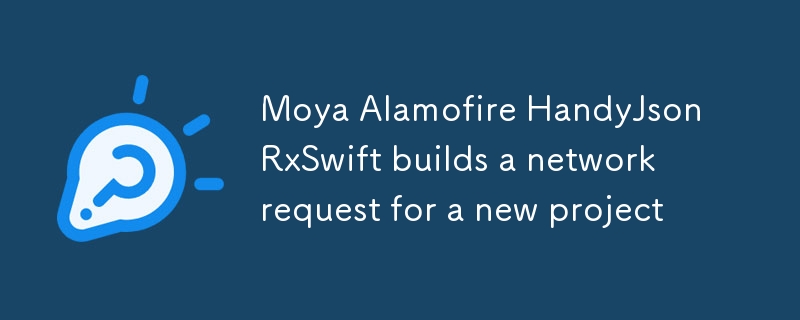
This article demonstrates how to use Moya, a type-safe networking library, to manage network requests and responses. It also discusses the integration of Alamofire for advanced networking features and the utilization of RxSwift for handling asynchron

Moya is a network abstraction layer that provides an elegant and type-safe way to interact with network APIs. It simplifies the process of sending network requests and handling responses by providing a clear and concise way to define API endpoints, handle different types of responses, and manage request parameters.
To use Moya, you can create a new Moya provider instance and define the API endpoints you want to target. The provider will provide you with a convenient API for making network requests and handling the responses in a type-safe manner.
<code class="swift">// Define the API endpoint
enum MyAPI {
case fetchUsers
}
// Create a Moya provider
let provider = MoyaProvider<MyAPI>()
// Make a network request
provider.request(.fetchUsers) { result in
switch result {
case .success(let response):
// Handle successful response
if let json = try? response.mapJSON(failsOnEmptyData: false) as? [String: Any] {
// Parse the JSON response
}
case .failure(let error):
// Handle failure response
print("Error: \(error)")
}
}</code>Alamofire is a popular networking library that provides a wide range of advanced features for making and handling network requests. Moya can be easily integrated with Alamofire to take advantage of these features, such as custom SSL certificate handling, session management, and request/response logging.
To integrate Alamofire with Moya, you can create a custom Moya plugin that uses Alamofire. The plugin will provide you with access to the Alamofire functionality from within the Moya framework.
<code class="swift">import Alamofire
// Create a custom Moya plugin
class AlamofirePlugin: PluginType {
func prepare(_ request: URLRequest, target: TargetType) -> URLRequest {
// Customize the request using Alamofire
return request
}
}
// Add the plugin to the Moya provider
provider.plugins.append(AlamofirePlugin())</code>RxSwift is a reactive programming framework that provides a powerful and efficient way to handle asynchronous events and data streams. It can be combined with Moya to simplify the handling of asynchronous network requests and responses.
RxSwift can be used to create observables that represent the network requests. These observables can be subscribed to, and when a request completes, the observable will emit an event with the response data.
<code class="swift">import RxSwift
// Create an observable for the network request
let observable = provider.rx.request(.fetchUsers)
// Subscribe to the observable
observable.subscribe(onNext: { response in
// Handle successful response
if let json = try? response.mapJSON(failsOnEmptyData: false) as? [String: Any] {
// Parse the JSON response
}
}, onError: { error in
// Handle failure response
print("Error: \(error)")
})</code>RxSwift allows you to handle asynchronous network requests in a concise and efficient manner, making it ideal for building complex and scalable networking applications.
The above is the detailed content of Moya + Alamofire + HandyJson + RxSwift build a network request for a new project. For more information, please follow other related articles on the PHP Chinese website!




